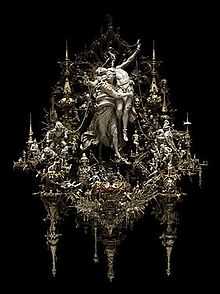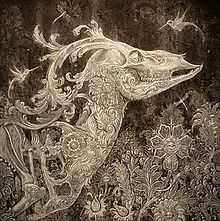Kris Kuksi
| Kris Kuksi | |
|---|---|
| Born |
2 March 1973 Springfield, Missouri |
| Nationality | American |
| Known for | Assemblages, painting, drawing |
| Movement | Classical roots; related to Surrealism |
| Website | |
|
kuksi | |
Kris Kuksi is an American artist in the genre of Fantastic Realism.[1] Specializing in creating complex artistic installations, his work has been described as “a study in timelessness and intricacies, reminiscent of lost civilizations, deities and ruins – perfectly preserved.”[2] Kuksi’s work has been displayed at more than 100 exhibitions worldwide, including satellite art fairs of Art Basel, Pulse (Los Angeles and Miami) and Scope (Basel and Miami),[3] Liste Köln during the Cologne Art Fair in Germany and the Smithsonian National Portrait Gallery in the juried show “The Outwin Boochever Portrait Competition Exhibition.”[4] He has also been featured on the front covers of Philosophie[5] and Bl!sss Magazine,[6] and his work is owned by collectors ranging from film director Guillermo del Toro[7] to the Ellis County Bar Association in Kansas.[8]
Early life
Born on March 2, 1973, in Springfield Missouri, Kris Kuksi grew up in neighboring Kansas. He spent his youth in a rural setting along with a blue-collar, working mother, two significantly older brothers and an absent father. In the absence of external distractions, Kuksi combined childhood toys including lego, spaceships and castles, and with materials such as bricks from a dilapidated barn to create dioramas and landscapes.[9] A lack of stimulation, from either technology in the form of television or from social interaction with other people fostered Kuksi’s imagination, allowing it to develop and grow. The artists has described how, living in an isolated, rural part of Kansas, there was little external stimulation or distraction and he “[drew and ran] amuck outside imagining worlds within my head.”[10]
Education
Kuksi attained a Bachelor of Fine Arts in Studio Painting in 1998 from Fort Hays State University, Hays in Kansas. He then completed a seminar on Studio Painting at Santa Reparata International School of Art in Florence, Italy in 2001[4] and was subsequently awarded a Master of Fine Arts in Studio Painting from Fort Hays State University in 2002.[11] Kuksi has also completed seminars in “Old Masters – New Visions” in Austria and Germany, in 2002 and 2005 respectively.[4]
Influences
Kuksi’s influences include the Baroque and Rococo periods. He has described how he feels more in belonging to the ‘Old World’ and that his artwork is very much a reaction to “the corrupt and demoralized fall of modern-day society – a place where new beginnings, new wars, new philosophies, and new endings exist.”[12][10] In an interview, Kuksi named Bernini, Bosch and Bruegel as some of the artists he admired and was influenced by saying, “Nothing beats landscapes of hell, twisted contorted figures, hedonism, and flowers sprouting from anuses.”[13]
At times, the artist’s work presents its audience with a jarring discomfiture of imagery, which hints at a disquieting future. A sense of loss features often, mirroring the loss felt at the death of a loved one or at the removal of civil liberties. Regarding the latter, Kuksi has warned of related dangers such as the rise of fundamentalism or dictatorship.[14] Also at issue, according to the artist, is the effect of people themselves on the Earth’s natural resources. Kuksi has described how the world is ”Overpopulated, losing precious resources, de-moralized, and polluted. If the Earth were a person she would be quite ill, infected with a sickness known as humanity.”[15] Referring to religion, he has suggested that an attachment to the apocalyptic “end times” described in the biblical Book of Revelation may result in humanity causing such prophesies to become self-fulfilling.[16] Kuksi has said that “…humanity is doomed if they can’t see the result of repeated historical rise and falls. Perhaps it is as simple as we just aren’t smart enough to save ourselves.”[10]
Assemblages

Kuksi cuts and reshapes old objects, small toys, mechanical components and other parts and refashions them into works of art that bear little resemblance to the original appearance. A wide range of materials are utilized, including model parts, wood and metal.[17] The artist describes these as ‘mixed media’ that are melded by “a flowing composition and visual balance.”[12] Kuksi’s work often combines images in disconcerting ways, such as “Churchtank” which merges images of religion and warfare.[18] The artist collects material from around the world for the assemblages, with components coming from Ukraine, Singapore, Germany, Prague, Philippines, Lithuania, Japan and Singapore. Items are either bought in person or delivered to his studio in Hays, Kansas.[19]
One reviewer has described Kuksi’s assemblages as a “…confusing amalgam. Hanging on a thread of being classical and solemn, … rococoish and ornate.”[10] These creations have become some of the artist’s most high-profile work and in interview he has commented that these appear to have an appeal for viewers and collectors, perhaps because of their three-dimensional aspect and “because they are like small worlds that you can spend a long time exploring.”[9] Others have described the experience “as if he put you on an uncomfortable armchair, widened your eyes with a brutal and cold machine and forced you to watch these seemingly far away realities, through the lens of our voyeurism.”[20]
Paintings and drawings

Kuksi has studied with established artists in Italy, Austria and Spain, including participating in several international workshops including “Painting the Fantastic” with Robert Venosa in Italy, “Old Masters New Visions Seminar” with Philip Rubinov Jacobson in Austria and “Painting Dali’s Garden”, with Venosa in Spain.[21]
The artist’s paintings combine discordant elements and suggest an affinity with the macabre and enigmatic,[1] as "images are enmeshed in successive layers of incongruous and bizarre subjects".[1] His paintings and drawings have been described as reminiscent of old masters in their depiction of anatomical creation.[1] In addition, they have been critiqued as incorporating elements of surrealism and displaying ‘hallucinatory patterns and shapes deep within the delirium of paranoia and obsessive behaviours.’[1] According to critics, Kuksi’s paintings are “either so realistic they could be photos or psychedelic, almost esoteric”[10]

Critical response
Kuksi’s work has been described as “mind-blowing, macabre and beautifully grotesque art…[that] will taunt you by the sheer complexity of detail, leaving you even more baffled as you stare for hours at all the figurines that were smacked into coexistence.”[12] The end result has been described as “intricately polarized narratives of the balance between good and evil, left and right, night and day, past and future.”[14] Kuksi has featured in more than 100 exhibitions worldwide, including Art Basel, Miami, Berlin, the Cologne Art Fair in Germany and the Smithsonian National Portrait Gallery.[4] He has won a number of awards including the Award of Merit from Williamsburg Art and Historical Center, and the First Place Award from Direct Art Magazine.[22] Additionally, Kuksi has been featured in books on sculpture and modern art, such as “Device Volume II: Reconstructed,” [23] and “Spider Pie.” [1] Kuksi's work can also been found on the front covers of Philosophie[5] and Bl!sss Magazine.[6] He has sold works of art at auction through Sotheby’s.[1] Collectors of Kuksi pieces include Kay Alden, actor Robin Williams, musician and director Fred Durst, director Chris Weitz, director Guillermo del Toro, Nike CEO Mark Parker, and the Ellis County Bar Association in Kansas.[24][2][22][7][8]
Books
Kuksi's book, Divination and Delusion (ISBN 0-9803231-3-4; ISBN 978-0-9803231-3-9), was published in 2010 by Last Gasp.
Personal life
Kris Kuksi is married with three young children. He lives with his wife Gwyn in Lawrence, Kansas, where he has his studio and gallery.
Awards
Kuksi's art has received several awards.[4][11]
- 2006
- Cash Award, Smoky Hill Art Exhibition, Hays Arts Center, Hays, Kansas
- Juror's Merit Award, Smoky Hill Art Exhibition, Hays Arts Center, Hays, Kansas
- Award of Excellence, "8th Annual All Media International Juried Online Art Exhibition," Upstream People Gallery, Omaha, Nebraska
- 2005
- "Who's Who in America: 60th Diamond Edition," published by Marquis Who’s Who, New Providence, New Jersey
- First Place Award, "Fantastic 2005," Artrom Gallery, Rome, Italy
- 2003
- Award of Merit, "Brave Destiny: Grand Surrealism Exhibition," Williamsburg Art and Historical: Center, New York, New York
- First Place Award, Direct Art Magazine, Slowart Productions, New York, New York
- 2001
- "Angel of the Arts Prize," St. Louis Artist’s Guild, Clayton, Missouri
References
- ↑ 1.0 1.1 1.2 1.3 1.4 1.5 1.6 Alyssa Sturgill (May 2005). Spider Pie. Raw Dog Screaming Press. pp. 23–. ISBN 978-1-933293-05-9. Retrieved 26 January 2012.
- ↑ 2.0 2.1 Jen Pappas. "The Art of Kris Kuksi". Joshua Liner Gallery. p. 55. Retrieved 2012-01-25.
- ↑ "7th Annual Pulse Miami Contemporary Art Fair". Tibetan Art Studio. Retrieved 2012-01-26.
- ↑ 4.0 4.1 4.2 4.3 4.4 "Artists Kris Kuksi". Joshua Liner Gallery. Retrieved 2012-01-24.
- ↑ 5.0 5.1 "Le XXI siècle sera-t-il religieux?". Philosophie Magazine. Retrieved 2012-02-01.
- ↑ 6.0 6.1 "Bl!sss Magazine November 2011". Bl!sss Magazine. Retrieved 2012-01-31.
- ↑ 7.0 7.1 "Art Platform L.A. Fair Los Angeles". Shcroeder Romero & Shredder. Retrieved 2012-01-25.
- ↑ 8.0 8.1 Bar Association of the State of Kansas; Kansas Bar Association (2003). The journal of the Kansas Bar Association. Bar Association of the State of Kansas. Retrieved 31 January 2012.
- ↑ 9.0 9.1 "The Everywhere Collector". Joshua Liner Gallery. p. 96. Retrieved 2012-01-25.
- ↑ 10.0 10.1 10.2 10.3 10.4 "Interview – Kris Kuksi". www.boonika.net. Retrieved 2012-01-24.
- ↑ 11.0 11.1 "Kris Kuksi". www.artadoo.com. Retrieved 2012-01-24.
- ↑ 12.0 12.1 12.2 Majzoub, Maha (October 2011). "Reuse, Amuse + Bemuse". Issuu. p. 24. Retrieved 2012-01-24.
- ↑ "The Everywhere Collector". Joshua Liner Gallery. p. 100. Retrieved 2012-01-25.
- ↑ 14.0 14.1 Hall, Kim. "Paradise Lost: The Prophetic Sculptures of Kris Kuksi". Professional Artist. p. 29. Retrieved 2012-01-24.
- ↑ "KrisKuksi". Joshua Liner Gallery. p. 47. Retrieved 2012-01-25.
- ↑ "KrisKuksi". Joshua Liner Gallery. p. 48. Retrieved 2012-01-25.
- ↑ "The Art of Kris Kuksi". Joshua Liner Gallery. p. 56. Retrieved 2012-01-25.
- ↑ Majzoub, Maha (October 2011). "Reuse, Amuse + Bemuse". Issuu. p. 27. Retrieved 2012-01-24.
- ↑ Pricco, Evan (October 2008). "The Everywhere Collector". Gottlund Verlag. pp. 100, 105. Retrieved 2012-01-25.
- ↑ Maurial, Amélie. "KrisKuksi". www.Be-street.com. p. 44. Retrieved 2012-01-25.
- ↑ "The Arts". Hays USA. Retrieved 2012-01-26.
- ↑ 22.0 22.1 "Kris Kuksi". Retrieved 2012-01-25.
- ↑ "Device Volume II: Reconstructed". Device Gallery. Retrieved 2012-01-31.
- ↑ Majzoub, Maha (October 2011). "Reuse, Amuse + Bemuse". Issuu. p. 27. Retrieved 2012-01-24.